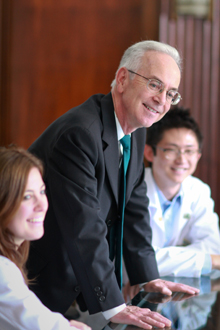
L. Lee Hamm, MD, senior vice president and dean of Tulane University School of Medicine in New Orleans, believes the field of nephrology is on the cusp of some major shifts in the clinical care of patients with renal disease, particularly where it relates to chronic kidney disease, dialysis therapy and transplant care.
“Over the past 10 to 15 years, there have been incremental impacts and not necessarily dramatic clinical changes, but I think now nephrology investigators are beginning to turn that around and we’re seeing things that will soon result in better patient care, like the discoveries of the roles of FGF-23, ApoL1, and antibodies to phospholi-pase A2 receptor,” he says.
Prior to joining Tulane in 1992 as Chief of Nephrology and Hypertension, Hamm held faculty appointments in Washington University’s Division of Nephrology and the Department of Cell Biology and Physiology for 10 years. He says his experiences here have helped to shape his academic career in patient care, research, education and administration.
“What drew me to Washington University for my first faculty position was that it was known as a nephrology powerhouse with prominent senior faculty members and outstanding research opportunities,” he says. “I had great institutional role models that I wanted to emulate and, because of them, I aspired to serve in leadership roles, which led me to Tulane. I’ve been here for 25 years.”
Interested in epithelial transport and acid-base homeostasis and its role in cell metabolism and function as a postdoctor-al nephrology fellow at the University of Texas Health Sciences Center, Hamm saw that he could fill a missing niche in renal research at Washington University School of Medicine. “When I arrived, the division was primarily focused on mineral metab-olism and there were giants in the field, notably Saulo Klahr, Eduardo Slatopolsky, Marcos Rothstein, Aubrey Morrison, James Delmez, Kevin Martin, Keith Hrsuka, David Windus, and George Shriner, some of who are still on faculty,” he recalls. “Because I was interested in epithelial transport, I’d like to think I helped to round out the research program at that time. There was a fabulous group of faculty to work among as well as excellent fellows. All in all, it was a very good atmosphere, both intellectually and on a personal level.”

Hamm has authored more than 120 original articles and book chapters and is co-editor of a major reference book on acid-base and electrolyte disorders. During his tenure at Tulane, where he also served as associate chairman for research and chair of the Department of Medicine before becoming dean, he increased the number of renal faculty, added a trans-plant fellowship, and enhanced patient care by expanding the number of renal clinics and dialysis units. He maintains ongoing research collaborations with physician scientists who are working on the same fundamental issues he ad-dressed while at Washington University, including studies of acid-base, citrate and ammonia transport.
“What’s gratifying now as dean is being able to put into place leadership in various programs and departments and seeing them prosper in their academic mission,” he says. “I see the institution as a whole and I believe that the lessons I learned both at Washington University and the University of Texas helped me to expand my vision for clinical, research and educational excellence.”